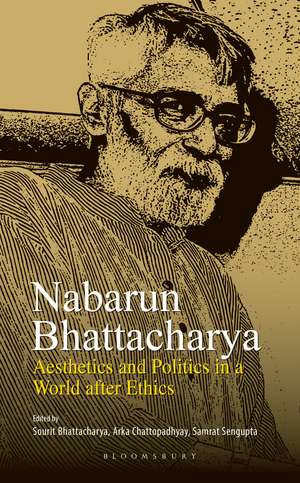Nabarun Bhattacharya: Aesthetics and Politics in a World after Ethics
Sourit Bhattacharya, Arka Chattopadhyay, Samrat Senguptaen Limba Engleză Hardback – 29 sep 2020
Preț: 509.86 lei
Preț vechi: 731.33 lei
-30% Nou
Puncte Express: 765
Preț estimativ în valută:
97.59€ • 102.33$ • 80.64£
97.59€ • 102.33$ • 80.64£
Carte indisponibilă temporar
Doresc să fiu notificat când acest titlu va fi disponibil:
Se trimite...
Preluare comenzi: 021 569.72.76
Specificații
ISBN-13: 9789388630504
ISBN-10: 9388630505
Pagini: 314
Dimensiuni: 135 x 216 mm
Greutate: 0 kg
Editura: Bloomsbury Publishing
Colecția Bloomsbury Academic India
Locul publicării:New Delhi, India
ISBN-10: 9388630505
Pagini: 314
Dimensiuni: 135 x 216 mm
Greutate: 0 kg
Editura: Bloomsbury Publishing
Colecția Bloomsbury Academic India
Locul publicării:New Delhi, India
Caracteristici
Presents Nabarun's works in the light of ethical and political crisis in a world where no simple, monochromatic idea of doing justice to can be sustained
Notă biografică
Sourit Bhattacharya is Lecturer in Postcolonial Studies in the School of Critical Studies at the University of Glasgow.Arka Chattopadhyay is Assistant Professor in the Department of Humanities and Social Sciences at the Indian Institute of Technology, Gandhinagar, India.Samrat Sengupta is Assistant Professor and Head, Department of English, Sammilani Mahavidyalaya, Kolkata, India
Cuprins
Foreword by Supriya Chaudhuri Preface by Tathagata Bhattacharya Acknowledgements Nabarun Bhattacharya and His World: An Introduction by Sourit Bhattacharya, Arka Chattopadhyay and Samrat Sengupta Part I: Nabarun Bhattacharya's Works in TranslationShort StoriesImmersion, translation by Rijula Das Scarecrow, translation by Rijula Das Fyataru in Spring Festival, translation by Debadrita Bose 4+1, translation by Arka Chattopadhyay Toy, translation by Arka Chattopadhyay Leopard-Man, translation by V. Ramaswamy Terrorist, translation by V. Ramaswamy American Petromax, translation by V. Ramaswamy Nuclear Winter, translation by Sourit Bhattacharya PoemsThis Valley of Death Is Not My Country, translation by Atindriya Chakrabarty Who in the Moonlight, with Rifles on Shoulders., translation by Atindriya Chakrabarty and Malini Bhattacharya What Kind of City Is This, translation by Supriya Chaudhuri Tram, translation by Supriya Chaudhuri Something's Burning, translation by Supriya ChaudhuriType, translation by Samrat Sengupta Disabled Three, translation by Samrat Sengupta A Family Poem, translation by Samrat Sengupta Interview with Nabarun BhattacharyaThere Is an Uncanny Pluralism in Marxism, translation by Partha Pratim Roy Chowdhury Part II: Critical Essays on Nabarun BhattacharyaKolkata and the Poetics of Waste in Nabarun Bhattacharya's Spectral City, Anuparna Mukherjee Fyataru As Political Society: Nabarun Bhattacharya and the Postcolonial Politics of the Governed, Anindya Sekhar PurakayasthaCounter-History, Counter-Memory and the Harami: The Fictional World of Kangal Malshat, Anustup Basu A Cyborg Goddess? Baby K and the Symbolisms of Gendered Violence, Priyanka Basu Dancing Skulls and Red Hibiscus Flowers: Nabarun's Tantric Imaginaries and the Radical Aesthetics of Subversion, Carola Erika Lorea The Revolt of the Bete Machine: Animality, Language and Resistance in Lubdhak, Aritra Chakraborti Machine, Bio-Politics and Death in Nabarun Bhattacharya's Fiction, Arka Chattopadhyay #Animalosa: A Study of the Theroid Cosmic in Nabarun's Fiction, Dibyakusum Ray Toxic Ecologies of the Global South: The Ecogothic in Nabarun Bhattacharya's Toy City, Sourit Bhattacharya The Unknown Something: Objects beyond the Economy of Use in Nabarun's Short Stories, Samrat Sengupta 'Fyant Fyant Snai Snai'-The Clarion Call of the Masses and Bengali Entertainment, Arnab Banerji List of Contributors
Recenzii
This is an exceptional and painstaking work of rare dedication that is structurally expansive and conceptually rigorous. Most significantly, the editors and the team of translators, interviewers and critical essayists have elegantly woven a complex tapestry of aesthetics, politics and ethics that marks one of the most involved, committed and intricate authors of our time. The book radiantly brings to light the myriad trajectories through which Nabarun Bhattacharya was able to catch and express the deepest undertones of our overwrought times. Beneath that tale lies another layer-that, like all true political prophets, Bhattacharya could presciently prefigure and predict-an ominous and macabre sublunar future, the contours of which continue to remain spectral and contingent.
This is a timely introduction to Nabarun, a major activist writer of minor literature, inhabiting the borderlands of the ubiquitous modern order of capital, in the space-time of contemporary Kolkata. The book contains short stories, poems, an interview with the writer and essays on him-a well-curated collection, offering a rounded representation of Nabarun. As the book highlights, the deep subaltern denizens of Nabarun's world may be voided of agency and use but can't be voided of the imagination of freedom. Through the intervention of this text, Nabarun's radical insight and technologies of posthuman praxis will be available widely, inspiring many versions of another kind of life, a plural participatory anarchy of friendship.
This is a timely introduction to Nabarun, a major activist writer of minor literature, inhabiting the borderlands of the ubiquitous modern order of capital, in the space-time of contemporary Kolkata. The book contains short stories, poems, an interview with the writer and essays on him-a well-curated collection, offering a rounded representation of Nabarun. As the book highlights, the deep subaltern denizens of Nabarun's world may be voided of agency and use but can't be voided of the imagination of freedom. Through the intervention of this text, Nabarun's radical insight and technologies of posthuman praxis will be available widely, inspiring many versions of another kind of life, a plural participatory anarchy of friendship.
